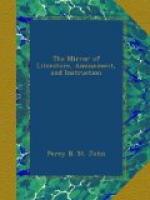It was the wedding day of Mr. and Mrs. Terry, (I mean the actual, not the anniversary wedding-day,) and the jocund bridegroom, bride, and their guests were assembled about noon in the drawing-room, when a servant entered, and said a gentleman had called, and wished to speak to Mr. T.; that he was waiting below stairs, and would not come up, because he came upon very particular business. Mr. Terry, desiring his company to excuse him for a few minutes, quitted the room. One hour elapsed—no bridegroom; two hours—he did not appear;—three—four—he was not returned: the bride’s mind misgave her, and the hymeneal guests were quite alarmed: the servants declared that they had seen their master and the gentleman walk into the garden, from whence they were not returned. Now, a high brick wall, in which there was no outlet, and over which no person could climb except by a ladder, enclosed the garden, which, when searched, was empty, whilst, at the same time, Mr. Terry and his friend, “the gentleman,” could not have walked out at the hall-door without being, from its situation, seen and heard by the servants in the kitchen. Time fled—and he did not return—no!—and although his lady lived to be nearly ninety years of age, she never gained tidings again of the spouse, thus so mysteriously spirited away!
Raising the Wind.
The superstitions of sailors are not few, as those assert who are conversant in maritime affairs. Amongst others, is the custom, pretty well known, of whistling for a wind. A gentleman told me, that, on his first voyage, being then very young, and ignorant of sea usages, he was in the habit of walking the deck a great deal, “and whistling as he went,” perhaps “for want of thought”—perhaps for lack of something better to do. Shortly, he fancied that the captain of the vessel seemed not a little annoyed whenever this took place, although he kept a respectful silence upon the subject. At length Mr. —— resolved to speak to him himself: and, accordingly, one day, when it blew a pretty brisk gale, said, “I observe, captain, that you appear particularly uneasy whenever I whistle.”—“To say the truth, sir, I am just now,” replied he. “On a fair, still day, whistle as much as you please; but, when there is a wind like this, we don’t like to have any more called.”—New London Literary Gaz.
* * * * *
THE SELECTOR
AND
LITERARY NOTICES OF
NEW WORKS.
* * * * *
A PHILOSOPHICAL KITCHEN.
A romantic and ludicrous novel has just appeared, entitled “The Mummy, or Tale of the Twenty-second Century,” exhibiting some of the probable results of “the march of intellect;” and of the pungency of its satire the following is a fair specimen, describing a kitchen in the twenty-second century:—




